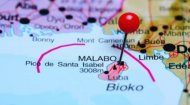|
Some of the must-visit destinations include:
Malabo Cathedral: This stunning neo-Gothic cathedral (left) was built in the early 20th century and is a prime example of Spanish colonial architecture. The cathedral's intricate stained-glass windows and soaring spires are a sight to behold.
 Presidential Palace: Located in the heart of Malabo, the Presidential Palace is a grandiose building that serves as the official residence of the President of Equatorial Guinea. While not open to the public, the palace's imposing facade and well-manicured gardens make it a popular photo spot.
Presidential Palace: Located in the heart of Malabo, the Presidential Palace is a grandiose building that serves as the official residence of the President of Equatorial Guinea. While not open to the public, the palace's imposing facade and well-manicured gardens make it a popular photo spot.
Pico Basile: The highest peak on the island of Bioko, Pico Basile offers breathtaking views of Malabo and the surrounding landscape. Adventurous travelers can hike to the summit, while less experienced hikers can take a guided tour to enjoy the scenery.
Malabo National Museum: Housed in a historic colonial building, the Malabo National Museum showcases the country's rich cultural heritage, with exhibits on traditional clothing, music, and art. The museum also offers insights into Equatorial Guinea's history, from its pre-colonial past to its present-day challenges.
Beaches: Malabo is blessed with several beautiful beaches, including Arena Blanca and Sipopo. These pristine stretches of sand offer a perfect escape from the hustle and bustle of the city, with opportunities for swimming, sunbathing, and water sports.
 Today much of Malabo, with its population of 65,015 according to World Population Review, is fairly run down, with much litter and fading colonial buildings, despite having a booming oil sector with oil rigs scattered offshore, oil tankers in abundance and the flames from oil refineries along the coast lighting up the sky. However little of the revenue from this oil, which was discovered in the mid 1990s, has been reinvested in the city's infrastructure with it only having, for example, about 300 hotel beds, of which only 50 are of usable quality. Downtown Malabo is in an even worse state of decay, and, as such, carrying maps and taking photographs is largely forbidden although the police may give permission in return for a 'favour' to stop your camera being confiscated. Today much of Malabo, with its population of 65,015 according to World Population Review, is fairly run down, with much litter and fading colonial buildings, despite having a booming oil sector with oil rigs scattered offshore, oil tankers in abundance and the flames from oil refineries along the coast lighting up the sky. However little of the revenue from this oil, which was discovered in the mid 1990s, has been reinvested in the city's infrastructure with it only having, for example, about 300 hotel beds, of which only 50 are of usable quality. Downtown Malabo is in an even worse state of decay, and, as such, carrying maps and taking photographs is largely forbidden although the police may give permission in return for a 'favour' to stop your camera being confiscated.
Despite this, the central area, (which is normally bathed in fog), around Ave de la Independencia has many decent shops, colourful markets where locals sell fresh produce, handicrafts, and traditional clothing, hotels and restaurants with a somewhat cosmopolitan feel reflecting the oil industry workforce. For tourists who can afford the oil price inflated hotel accommodation, the cathedral and French and Spanish cultural centres are well worth a visit. You can get to Malabo via Malabo International Airport, or by ferry from Douala in Cameroon or from Bata, Equatorial Guinea's former capital on the mainland. |







 Presidential Palace: Located in the heart of Malabo, the Presidential Palace is a grandiose building that serves as the official residence of the President of Equatorial Guinea. While not open to the public, the palace's imposing facade and well-manicured gardens make it a popular photo spot.
Presidential Palace: Located in the heart of Malabo, the Presidential Palace is a grandiose building that serves as the official residence of the President of Equatorial Guinea. While not open to the public, the palace's imposing facade and well-manicured gardens make it a popular photo spot. Today much of Malabo, with its population of 65,015 according to World Population Review, is fairly run down, with much litter and fading colonial buildings, despite having a booming oil sector with oil rigs scattered offshore, oil tankers in abundance and the flames from oil refineries along the coast lighting up the sky. However little of the revenue from this oil, which was discovered in the mid 1990s, has been reinvested in the city's infrastructure with it only having, for example, about 300 hotel beds, of which only 50 are of usable quality. Downtown Malabo is in an even worse state of decay, and, as such, carrying maps and taking photographs is largely forbidden although the police may give permission in return for a 'favour' to stop your camera being confiscated.
Today much of Malabo, with its population of 65,015 according to World Population Review, is fairly run down, with much litter and fading colonial buildings, despite having a booming oil sector with oil rigs scattered offshore, oil tankers in abundance and the flames from oil refineries along the coast lighting up the sky. However little of the revenue from this oil, which was discovered in the mid 1990s, has been reinvested in the city's infrastructure with it only having, for example, about 300 hotel beds, of which only 50 are of usable quality. Downtown Malabo is in an even worse state of decay, and, as such, carrying maps and taking photographs is largely forbidden although the police may give permission in return for a 'favour' to stop your camera being confiscated.


